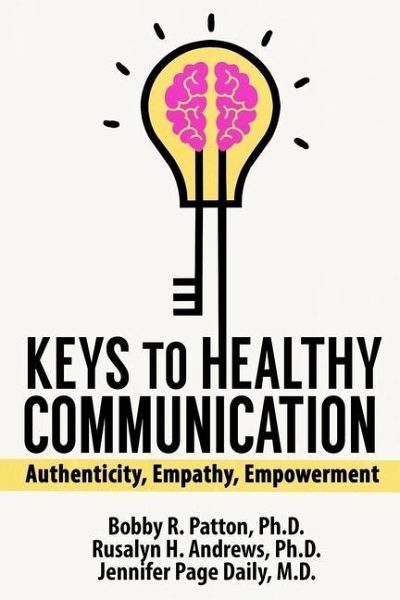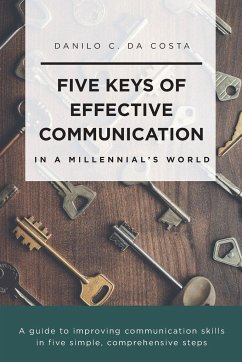
Keys to Healthy Communication
Authenticity, Empathy, Empowerment
Versandkostenfrei!
Versandfertig in 1-2 Wochen
15,99 €
inkl. MwSt.

PAYBACK Punkte
8 °P sammeln!
Keys to Healthy Communication is written strategically to improved personal physical and mental health, to foster healthier relationships and to develop a better understanding of how to build and participate in a healthier society. Contemporary issues, such as the COVID-19 pandemic, are used to illustrate negative and positive results of communication actions. It is possible to be authentic, empathic, and empowered in our actions and our interactions. It is possible to be mindful of our potentially harmful responses and rewire our brains to ultimately control them. It is possible to be healthi...
Keys to Healthy Communication is written strategically to improved personal physical and mental health, to foster healthier relationships and to develop a better understanding of how to build and participate in a healthier society. Contemporary issues, such as the COVID-19 pandemic, are used to illustrate negative and positive results of communication actions. It is possible to be authentic, empathic, and empowered in our actions and our interactions. It is possible to be mindful of our potentially harmful responses and rewire our brains to ultimately control them. It is possible to be healthier than we are. And this book opens doors to better health. The human brain is the central organ that affects and is affected by states of health. We follow the evolution of the human brain with particular attention to the fight/flight/freeze reaction. Due to the automatic survival system built into our brains, the ability to communicate in healthy ways diminishes when we feel threatened or stressed. So, when our survival instincts take over, we citizens of the 21st century are each capable of reacting as Neanderthals. Neuroscientific discoveries provide the basis for understanding and controlling harmful responses. The absence of authenticity harms all facets of our lives. For the individual, a lack of self-awareness leads to many psychological and emotional problems. Authenticity demands that we be realistic, neither naively hopeful nor overly self-critical. Fear of people seeing the "real me" can cause me to "just put on an act," pretending to be someone at odds with my true inner feelings or beliefs. Relationships develop according to the degree of authenticity reciprocated between parties. Inauthenticity leads to manipulation, game-playing, deception, disappointments, and even abuse. Appropriate self-disclosure is a sign of good mental health, and results in greater competency, adaptability, and trust. Deceptions, scams, and untruths have led to a decline of trust in our society. Our perception of reality has been victimized, and trust diminished. Different versions of "reality" result in allegations of "fake news" and distort how people see the world and respond to it. Trust is necessary for our democracy to function and the world as we know it to survive. Empathy is the act of understanding thoughts and feelings of another individual. The empathic response allows the needs of both communicators to be met. Physical and mental health are related to the presence and use of empathy. Empathy is a necessary component of a healthy relationship. For a healthy society, the use of empathy includes taking on the experiences of people and cultures with whom we don't necessarily find identity or agreement. Such understanding increases the likelihood of better decision making. Empowerment involves accepting and utilizing our own inherent power in all situations. This means questioning self-imposed limits, refusing to identify external forces as the determiner of actions, and exercising our abilities to self-regulate. It is possible to help others recognize their own power in controlling their own lives. Each of us is responsible for controlling our own behaviors and destinies. This book provides exercises and practices that promote opportunities to develo














